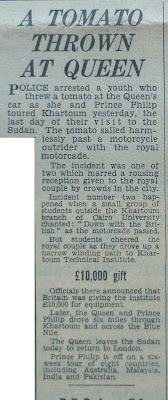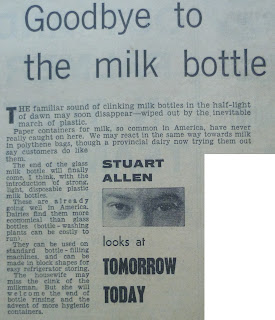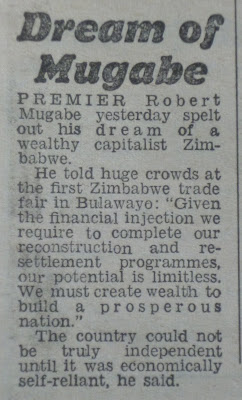Daily Mirror dated Tuesday February 26th
1929
Click to Read
Sir Malcolm Campbell took up motor racing in 1910 and first
broke the land speed record in 1924 by driving at 146mph. In 1927 and 1928 he
broke the record twice more but it wasn’t until February 1931, in South Africa,
he exceeded 250mph, the first driver to do so. His last record was set in 1937
when he managed 301mph at Bonneville Salt Flats. The current record, using a
jet propelled car is 763mph.
Click to Read
Biological warfare dates beck to at least the 6th
century BC and its use by the Assyrians. In World War I the Germans tried to
use anthrax and glanders but were none too effective because of their poor
delivery methods. To spread glanders they had to infect horses and then it only
spread to humans if they touched the infected animals. I read a fascinating novel recently that was about this very thing - 'The Poison Tide' by Andrew Williams.
Click to Read
In late 1928 a civil war broke out in Afghanistan as a
result of the King trying to Westernise the country. By December Kabul was
overrun by rebels and the British Minister Sir Francis Humphrys became worried
for the safety of the British Consul and its staff. He contacted the RAF in
India and arranged an airlift for over 300 women and children which was
accomplished between December 23rd and 31st. Between January
14th 1929 and February 25th the rest of the staff, other
expatriate nationals and the Afghan Royal family were brought out. Sir Francis
was on the last plane. This action by the RAF has gone down in history as the
first mass airlift.
Click to Read
Jack Dempsey had been World Heavyweight Boxing Champion of
the World but retired in 1927 after losing a bout to Gene Tunney. He continued
to give exhibition fights and went into management/promotion. He opened a
restaurant in Times Square, New York, which I visited for a superb steak the
year before it finally closed in 1974.
Click to Read
Chaplin had begun filming ‘City Lights’ at the end of
December 1928 and by February was still working on the first scene where his
character, the Tramp, meets the blind flowergirl. There was a lot of tension on
the set caused by a mutual dislike between Chaplin and his co-star Virginia
Cherrill.
Click to Read
And the moral of this tale is not to test for strychnine by
tasting it.
Click to Read
Edinburgh born Sir Harry Lauder had been a coal-miner before
becoming a very popular and famous music-hall comedian and singer. He wrote his
own songs including the standard ‘Keep Right on to the End of the Road’ and
toured the USA and Australia. I’m not sure that posing next to a dead shark
would be quite so acceptable today.
Click to Read
Fred Duprez was an American born film actor and comedian,
but the name that jumps out for me is George Carpentier the French boxer who had been, at various
times, Middleweight Champion of Europe, Light-heavyweight Champion of Europe
and Heavyweight Champion of Europe. He had fought Jack Dempsey in 1921 for the
Heavyweight Championship of the World, but was knocked out. He retired from
boxing and went on to appear in vaudeville as a song and dance man, he appeared
in a few films and then spent the rest of his life running bars and restaurants
in Paris.
Click to Read
Mrs Kate Meyrick was a nightclub owner in London in the
1920’s. The clubs were patronised by both High Society and gangsters and,
although prohibition never came to the UK there were strict licensing laws and
opening hours, which Mrs Meyrick was happy to ignore. The police thought
otherwise and she went down for several short prison terms. In 1928 Police
Sergeant George Goddard who was in charge of the raids on her clubs was
arrested for taking bribes. Mrs Meyrick was implicated and she was sentenced to
15 months’ hard labour – she was 53 years-old and it ruined her health. She
retired and died in 1933.
Click to Read
There’s nothing new about suspicious contents in processed
food as this ‘Pip, Squeak and Wilfred’ cartoon for younger children shows,
although I don’t think any old boots have been found in anyone’s lasagne yet.
Click to Read
The Ideal Home Exhibition, founded by the Daily
Mail newspaper, ran annually at Olympia from 1908 until 1978 as a showcase for
domestic design and innovation.
Click to Read
The music-hall singer and stage actress Lily Langtry
(sometime spelt Lillie Langtry) became famous as the mistress of Edward VII
when he was Prince of Wales. Albert (i.e. Edward - I wish these royals didn’t
change name when enthroned) had built a hideaway for Lily and himself in Derby
Road, Bournemouth, which is now known as the Langtry Manor Hotel.
She spent her final years living in Monaco with Mrs Peat the
widow of her former butler. She died in Monaco but, as can be seen above, was
returned to her birthplace in Jersey for burial.



































